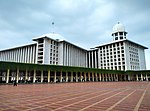Usman bin Yahya
Pondok Bambu | |
|---|---|
| Other names | Habib Usman bin Yahya |
| Occupation(s) | Islamic scholar, Mufti |
| Employer | Dutch East Indies |
| Known for | Mufti of Batavia |
| Notable work | preaching |
| Title | Habib |
| Parent(s) | Abdullah bin Aqil (father) Aminah (mother) |
Usman bin Yahya, Utsman ibn Yahya or Othman bin Yahya (
History
His father moved to Mecca when Uthman was 3 years old, so Uthman was taken care of by his grandfather, Aqil. His grandfather has many other sons, besides the father of Uthman. Many of his sons became scholars in Mecca, such as Sayyid Ishaq, who died in the city of
Uthman had a family relationship with
Uthman died in 1913 CE (precisely on 21 Safar 1331 AH) at more than 90 years of age. He was buried in the
Education
Uthman studied
He also went to and studied in Egypt and once married to an Egyptian woman. He continued his journey to Tunisia, where he often exchanged ideas with the Mufti of
Career
In Rabi 'al-Awwal 1279 AH (1862 CE) he went back to Batavia after 22 years of journey to seek knowledge and settled in Petamburan, Tanah Abang area. Over there, he wrote and compiled books, especially about amalil yaum (daily remembrances) and books about sins, unbelieving, polytheism and on subjects that are contrary to Aqidah. In his life, he has written about 116 books.[4] One of the books he authored, al-Qawānin al-Syar'iyyah li ahli al-Majālisi al-Hukmiyati wal ‘Iftiayati, was even used as a reference in the religious courts system in Indonesia at least until the 1950s.
To make ends meet for him and his family, Uthman founded his own printing company named Pertjetakan Batu. Moreover, his lithographic printing press is the first in Indonesia and became a pillar of the local spreading of intellectualism within the period.[6]
He also opened his Majelis Taklim (a gathering to seek religious knowledge) which was attended by many people including some other scholars from all over Batavia and surrounding areas, Among his students was
Uthman was appointed as Mufti of Batavia in 1871 (1289 AH). The Dutch government paid him a monthly stipend starting from 1889 until his death to provide advice on Islamic policy, with the title of Honorary Adviser for Arab Affairs in 1891.
Uthman was also active in local politics. Along with Hugronje he interfered with the appointment of a new
Controversies
Habib Uthman's attitudes in politics were sometimes quite controversial, especially in his position on jihad and Holy War, particularly concerning a riot against the Dutch in Cilegon, Banten. Although Habib Uthman had good reason in his argument, many scholars alleged him as a colonial stooge. Moreover, he was also hard against mystical practices, as he wrote in the book Manhaj al-Istiqamah. In a letter dated March 26, 1891, Snouck wrote about Sayyid Uthman's opinions in regards to jihad which was interpreted incorrectly by some Indonesian Muslims: "Many people were 'misled' by some law doctrines of jihad, and they thought that a Muslim person is justified in the presence of God to do acts such as to take possessions of the unbelievers, Chinese or dutch people for himself ... "[5] Uthman also assisted Hurgronje by issuing fatwa to support the Dutch war against Aceh.
Among other incidents which drew the ire of
His work
Uthman published religious books in Arabic and Malay (written in
References
- ISBN 978-9798880162.
- ISBN 9781108201353.
- ^ a b c "Menelusuri Jejak Keturunan Mufti Betawi" (in Indonesian). Retrieved September 1, 2014.
- ^ a b c d "Habib Usman bin Abdullah bin Yahya". Retrieved September 1, 2014.
- ^ a b "Habib Usman bin Yahya, Sang Mufti Batavia Pada Abad 19" (in Indonesian). June 8, 2008. Retrieved September 4, 2014.
- ^ Muhammad, Noufal. "Habib Utsman bin Yahya, Sang Mufti Betawi" (in Indonesian). Retrieved September 4, 2014.
- ISBN 978-1-137031716. Retrieved September 4, 2014.
- ISBN 978-9798391347.
- ISBN 978-9-004172319. Retrieved September 4, 2014.
- ISBN 978-900-4278707. Retrieved Aug 18, 2015.
- ISBN 978-9-004107717.

